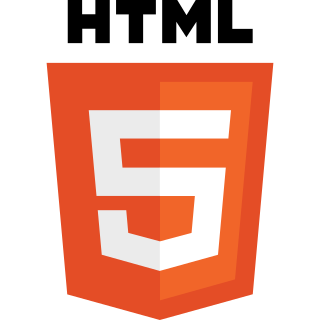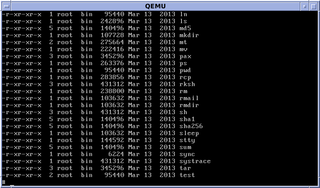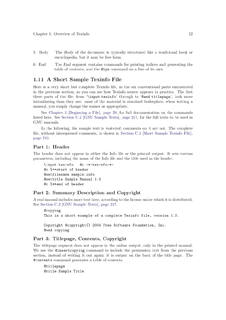Perl Programming Documentation, also called perldoc, is the name of the user manual for the Perl 5 programming language. It is available in several different formats, including online in HTML and PDF. The documentation is bundled with Perl in its own format, known as Plain Old Documentation (pod). Some distributions, such as Strawberry Perl, include the documentation in HTML, PDF, and pod formats.

A programming language is a formal language, which comprises a set of instructions that produce various kinds of output. Programming languages are used in computer programming to implement algorithms.

Hypertext Markup Language (HTML) is the standard markup language for documents designed to be displayed in a web browser. It can be assisted by technologies such as Cascading Style Sheets (CSS) and scripting languages such as JavaScript.
Software documentation is written text or illustration that accompanies computer software or is embedded in the source code. The documentation either explains how the software operates or how to use it, and may mean different things to people in different roles.
perldoc is also the name of the Perl command that provides "access to all the documentation that comes with Perl", from the command line.

Perl is a family of two high-level, general-purpose, interpreted, dynamic programming languages. "Perl" refers to Perl 5, but from 2000 to 2019 it also referred to its redesigned "sister language", Perl 6, before the latter's name was officially changed to Raku in October 2019.

A shell script is a computer program designed to be run by the Unix shell, a command-line interpreter. The various dialects of shell scripts are considered to be scripting languages. Typical operations performed by shell scripts include file manipulation, program execution, and printing text. A script which sets up the environment, runs the program, and does any necessary cleanup, logging, etc. is called a wrapper.
troff is the major component of a document processing system developed by AT&T Corporation for the Unix operating system.

Vim is a clone, with additions, of Bill Joy's vi text editor program for Unix. Vim's author, Bram Moolenaar, based it upon the source code for a port of the Stevie editor to the Amiga and released a version to the public in 1991. Vim is designed for use both from a command-line interface and as a standalone application in a graphical user interface. Vim is free and open-source software and is released under a license that includes some charityware clauses, encouraging users who enjoy the software to consider donating to children in Uganda. The license is compatible with the GNU General Public License through a special clause allowing distribution of modified copies "under the GNU GPL version 2 or any later version".

grep is a command-line utility for searching plain-text data sets for lines that match a regular expression. Its name comes from the ed command g/re/p, which has the same effect: doing a global search with the regular expression and printing all matching lines. grep was originally developed for the Unix operating system, but later available for all Unix-like systems and some others such as OS-9.

In computing, ls is a command to list computer files in Unix and Unix-like operating systems. ls is specified by POSIX and the Single UNIX Specification. When invoked without any arguments, ls lists the files in the current working directory. The command is also available in the EFI shell. In other environments, such as DOS, OS/2, and Microsoft Windows, similar functionality is provided by the dir command. The numerical computing environments MATLAB and GNU Octave include an ls function with similar functionality.

The Microsoft Windows Script Host (WSH) is an automation technology for Microsoft Windows operating systems that provides scripting abilities comparable to batch files, but with a wider range of supported features. This tool was first provided on Windows 95 after Build 950a on the installation discs as an optional installation configurable and installable by means of the Control Panel, and then a standard component of Windows 98 and subsequent and Windows NT 4.0 Build 1381 and by means of Service Pack 4. The WSH is also a means of automation for Internet Explorer via the installed WSH engines from IE Version 3.0 onwards; at this time VBScript became means of automation for Microsoft Outlook 97. The WSH is also an optional install provided with a VBScript and JScript engine for Windows CE 3.0 and following and some third-party engines including Rexx and other forms of Basic are also available.

Texinfo is a typesetting syntax used for generating documentation in both on-line and printed form with a single source file. It is implemented by a computer program released as free software of the same name, created and made available by the GNU Project from the Free Software Foundation.
Doxygen is a documentation generator, a tool for writing software reference documentation. The documentation is written within code, and is thus relatively easy to keep up to date. Doxygen can cross reference documentation and code, so that the reader of a document can easily refer to the actual code.

In computer programming, glob patterns specify sets of filenames with wildcard characters. For example, the Unix Bash shell command mv *.txt textfiles/ moves all files with names ending in .txt from the current directory to the directory textfiles. Here, * is a wildcard standing for "any string of characters" and *.txt is a glob pattern. The other common wildcard is the question mark (?), which stands for one character.

tr is a command in Unix and Unix-like operating systems. It is an abbreviation of translate or transliterate, indicating its operation of replacing or removing specific characters in its input data set.
Plain Old Documentation (pod) is a lightweight markup language used to document the Perl programming language.
PerlMonks is a community website covering all aspects of Perl programming and other related topics such as web applications and system administration. It is often referred to by users as 'The Monastery'. The name PerlMonks, and the general style of the website, is designed to both humorously reflect the almost religious zeal that programmers sometimes have for their favorite language, and also to engender an atmosphere of calm reflection and consideration for other users.

BBEdit is a proprietary text editor made by Bare Bones Software, originally developed for Macintosh System Software 6, and currently supporting macOS.
In computing, exit is a command used in many operating system command-line shells and scripting languages.
In Unix-like operating systems, unlink is a system call and a command line utility to delete files. The program directly interfaces the system call, which removes the file name and directories like rm and rmdir. If the file name was the last hard link to the file, the file itself is deleted as soon as no program has it open.
getopt is a C library function used to parse command-line options.
bs is a programming language and a compiler/interpreter for modest-sized programs on UNIX systems. The bs command can be invoked either for interactive programming or with a file containing a program, optionally taking arguments, via a Unix shell, e.g., using a Shebang (Unix) #!/usr/bin/bs.












